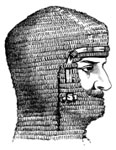
Croatia: “The Ramparts of Christendom”
TODAY THE ENEMY IS SECULAR LIBERALISM
In recent years Croatia has received much attention in the Western press for its politics and nationalism. Very little has been written on the country’s religious life and on the central role played by the Catholic Church in the development of this small Balkan nation and its successful bid for independence from Yugoslavia.
It is almost impossible to imagine that Croat nationalists could have secured their country’s sovereignty — or even that they would have wanted to — without the support of the Croatian Catholic Church. The national identity of the Croats rests on their Catholicism, especially since they are ethnically indistinguishable from the Serbs, and Croats and Serbs (though using different alphabets) speak the same language. Croatia looks and feels like a province of old Austria-Hungary. Its culture is part of the civilization of Hapsburg central Europe, rather than Balkan. Croats see themselves as distinct from the Orthodox Serbs, whom they view as part of an Eastern, Byzantine civilization and whose cultural outlook was profoundly affected by 500 years of domination by the Ottoman Turks. Croatia’s historical proximity to both the Orthodox Serbs and the Ottoman Muslims — its location on the frontier between West and East, between Rome and Constantinople — helps explain why the Croats feel their Catholicism so intensely.
Croatia has always been restive under its numerous overlords. First came the Hungarians, who in the 11th century conquered the kingdom founded by Croatia’s first king, Tomislav. Then came the Tatars in the 13th century, sweeping in from the east and razing Zagreb. They were followed by the Ottoman Turks, who in the 1520s annexed large amounts of Croatian territory, threatening to overrun Western Christendom itself. This prompted Pope Leo X to describe Croatia as Antemurale Christianitatis — the ramparts of Christendom. From 1527 to 1918 the country was under Hapsburg rule. In 1919, with the Treaty of Versailles, it became part of Yugoslavia. In January 1992, after a bitterly contested war, Croatia finally fulfilled what its President Franjo Tudjman called the Croats’ “thousand-year-old dream of independence.”
The Croats’ desire for a homeland and state of their own has gained them the enmity of the Western media. With the exception of a few writers such as William Safire and William F. Buckley, Western commentators have been hostile to Croatian yearnings for independence, blaming Croatia’s nationalist aspirations for the disintegration of Yugoslavia. The New York Times, The Washington Post, and other publications have consistently portrayed President Tudjman, and the Croats in general, as innate fascists who secretly desire to reimpose Croatia’s Ustashe Nazi-puppet regime of World War II which murdered many Serbs, Jews, and Gypsies.
You May Also Enjoy
As of this writing, peace seems to be breaking out again in Central America. This…
Ryszard Legutko traces the twin developments of liberalism and democracy and shows how, at their precise intersection, the totalitarian impulse rises.
Honest-to-goodness Communists are not all alike.

